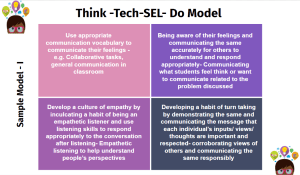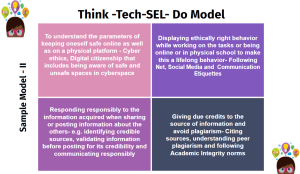Ms. Gunjan Tomar, Activities Coordinator and Learning Support Facilitator – DPS International School, Gurugram
Ms. Vineeta Garg, IT Head – SRDAV Public School, New Delhi


Ever since the World has been hit by the pandemic, and the mode of communication and working has been shifted from physical to virtual mode, there has been an exponential rise in the cases of compromised cyber safety and security and academic dishonesty in the field of education too.
The root cause that can be seen behind these challenges is the lack of awareness about cyber safety, cyber security and academic integrity. In short, we can say inadequate knowledge and awareness about cyber ethics.
The term “Cyber Ethics” refers to a set of guidelines for appropriate and responsible online behaviour. Knowledge and understanding of cyber ethics equip individuals to use cyberspaces safely and effectively for themselves as well as guide others to do the same as a part of their responsibility of giving back to society. They understand that accessibility of cyberspaces or devices is their privilege and rights, but with rights come responsibilities too. If responsibilities are not taken care of, they may lead to unethical use of cyberspace and at times being a victim of cyber-crimes/ bullying and compromising academic integrity.
Today’s – children are digital natives and have grown up with digital technologies. Even if the students are comfortable and skilled with technology, the ways they use it may not be appropriate in absence of adequate knowledge and understanding of Cyber Ethics. They may use technology in unethical ways, like finding ways to use unfair means on an assignment or bullying others on social media. Although an important part of life, educators often find it challenging to fit cyber ethics into their content-rich classes. With revolutionized technology intervention and potential of technology in education, there is a need to address this problem across disciplines so that the message and understanding of cyber ethics is received by students in the same manner as real-world ethics. This will help students to demonstrate responsible behaviour while using cyber spaces.
Digital citizenship integrated with Social Emotional Learning experiences can address this challenge effectively and seamlessly.
Digital citizenship which is about thinking critically, behaving safely, and participating responsibly and ethically in the digital world go hand in hand with cyber ethics and Social-Emotional Learning.
Social and Emotional Learning skills are helpful and important in managing these digital issues as these skills equip an individual to take responsible decisions not only for oneself but also for the community.
An important aspect of Digital Citizenship is to think critically when dealing with digital dilemmas. These are just not a set of rules but the foundation to build the character of an individual who is empowered to think and respond responsibly and empathetically while being in cyberspace for themselves as well as for others. Students won’t see any problem with plagiarism if they don’t understand integrity. They will not be able to support someone being bullied if they themselves don’t possess empathy for themselves and others.
CASEL’s Framework for Systemic Social and Emotional Learning is an integrated framework that highlights five SEL competencies promoted through multiple contexts. The SEL framework is intended to guide educators, families, and communities to promote students’ social, emotional, and academic learning. The CASEL Model of SEL clearly reflects the integrated approach to address SEL as a community involving school, parents and communities.
The Digital Citizenship and SEL integrated learning experiences equip the competencies for learning, teaching and leading in the digital age, providing a comprehensive roadmap for the effective use of technology in schools worldwide. It may be considered as a way in redefining learning and teaching and ensuring that using technology for learning can create high-impact, sustainable, scalable and equitable learning experiences for all learners.
Looking into the commonalities of SEL, Cyberethics and digital citizenship the following benefits can be considered for the students.
- Being Inclusive is to be open to hearing and respectfully recognizing multiple viewpoints, engaging with others online with respect and empathy. These can be connected to Social Awareness and relationship competencies of SEL.
- Being Informed is to evaluate the accuracy, perspective, and validity of digital media and social posts. This can be connected with Responsible Decision Making SEL competency.
- Being Engaged includes using technology and digital channels for civic engagement, to solve problems and be a force for good in both physical and virtual communities. These reflect the Relationship skills and responsible decision-making component of SEL.
- Being Balanced is to make informed decisions about how to prioritize time and activities online and offline. These reflect Self Management component of SEL
- Being Alert is being aware of one’s online actions, and knowing how to be safe and create safe spaces for others online. This can be aligned to Social Awareness and Self Awareness competencies of SEL
Here is a proposed SEL-TECH-DO Model that can be adopted to implement Digital Citizenship integrated with SEL practices across disciplines in education.




